Related Research Articles

The United Nations Environment Programme (UNEP) is responsible for coordinating responses to environmental issues within the United Nations system. It was established by Maurice Strong, its first director, after the United Nations Conference on the Human Environment in Stockholm in June 1972. Its mandate is to provide leadership, deliver science and develop solutions on a wide range of issues, including climate change, the management of marine and terrestrial ecosystems, and green economic development. The organization also develops international environmental agreements; publishes and promotes environmental science and helps national governments achieve environmental targets.

Albert II is the sovereign prince of Monaco and head of the House of Grimaldi. He is the son of Prince Rainier III and Grace Kelly.

The Global Environment Facility (GEF) was established on the eve of the 1992 Rio Earth Summit to help tackle our planet's most pressing environmental problems. The GEF unites 184 countries in partnership with international institutions, civil society organizations (CSOs), and the private sector to address global environmental issues while supporting national sustainable development initiatives. Since 1992, the GEF has provided close to $20.5 billion in grants and mobilized an additional $112 billion in co-financing for more than 4,800 projects in 170 countries. Through its Small Grants Programme (SGP), the GEF has provided support to nearly 24,000 civil society and community initiatives in 133 countries.
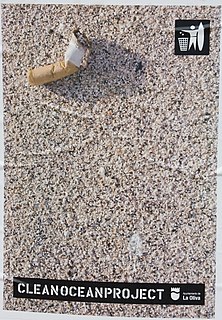
Environmental protection is the practice of protecting the natural environment by individuals, organizations and governments. Its objectives are to conserve natural resources and the existing natural environment and, where possible, to repair damage and reverse trends.

The Atlantic bluefin tuna is a species of tuna in the family Scombridae. It is variously known as the northern bluefin tuna, giant bluefin tuna [for individuals exceeding 150 kg (330 lb)], and formerly as the tunny.
The International Commission for the Conservation of Atlantic Tunas (ICCAT) is an intergovernmental organization responsible for the management and conservation of tuna and tuna-like species in the Atlantic Ocean and adjacent seas. The organization was established in 1966, at a conference in Rio de Janeiro, Brazil, and operates in English, French and Spanish. The organisation has been strongly criticised by scientists for its repeated failure to conserve the sustainability of the tuna fishery by consistently supporting over-fishing – an internal review branded ICCAT's policies on the eastern Atlantic bluefin tuna fishery a "travesty of fisheries management", and an "international disgrace". Conservationists often refer to ICCAT as "The International Conspiracy to Catch All Tuna".

Marine conservation, also known as ocean conservation, is the protection and preservation of ecosystems in oceans and seas through planned management in order to prevent the over-exploitation of these resources. Marine conservation is informed by the study of marine plants and animal resources and ecosystem functions and is driven by response to the manifested negative effects seen in the environment such as species loss, habitat degradation and changes in ecosystem functions and focuses on limiting human-caused damage to marine ecosystems, restoring damaged marine ecosystems, and preserving vulnerable species and ecosystems of the marine life. Marine conservation is a relatively new discipline which has developed as a response to biological issues such as extinction and marine habitats change.

The southern bluefin tuna is a tuna of the family Scombridae found in open southern Hemisphere waters of all the world's oceans mainly between 30°S and 50°S, to nearly 60°S. At up to 2.5 metres and weighing up to 260 kilograms (570 lb), it is among the larger bony fishes.
The United Nations Environment Programme established Champions of the Earth in 2005 as an annual awards programme to recognize outstanding environmental leaders from the public and private sectors, and from civil society. Typically, five to seven laureates are selected annually. Each laureate is invited to an award ceremony to receive a trophy, give an acceptance speech and take part in a press conference. No financial awards are conferred. This awards programme is a successor to UNEP's Global 500 Roll of Honour.

The year 2007 was proposed and declared as the (International) Year of the Dolphin (YoD) by the United Nations and United Nations Environment Programme (UNEP), along with the UN Convention on Migratory Species, and its specialized agreements on dolphin conservation ACCOBAMS and ASCOBANS and the WDCS.
The Group on Earth Observations (GEO) coordinates international efforts to build a Global Earth Observation System of Systems (GEOSS). It links existing and planned Earth observation systems and supports the development of new ones in cases of perceived gaps in the supply of environment-related information. It aims to construct a global public infrastructure for Earth observations consisting in a flexible and distributed network of systems and content providers.
Julia Marton-Lefèvre is a French - US environmentalist and academic. She studied history, ecology and environmental planning in the US and in France, and was born in Hungary.
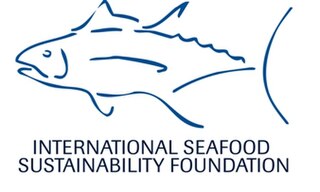
International Seafood Sustainability Foundation (ISSF) was formed in 2009 as a global, non-profit partnership among the tuna industry, scientists and World Wide Fund for Nature. The multistakeholder group states its mission is "to undertake science-based initiatives for the long-term conservation and sustainable use of tuna stocks, reducing bycatch and promoting ecosystem health". Regional Fisheries Management Organizations (RFMOs) are primarily responsible for managing the world's tuna stocks—skipjack, yellowfin and albacore tuna, the species most commonly processed for canned and shelf-stable tuna products, but their parliamentary procedures too often allow the short-term economic and political interests of nations to prevent sustainable measures from being adopted. ISSF works to ensure that effective international management practices are in place to maintain the health of all the tuna stocks.
Environmental governance is a concept in political ecology, environmental policy and human geography that advocates sustainability as the supreme consideration for managing all human activities—political, social and economic. Governance includes government, business and civil society, and emphasizes whole system management. To capture this diverse range of elements, environmental governance often employs alternative systems of governance, for example watershed-based management.
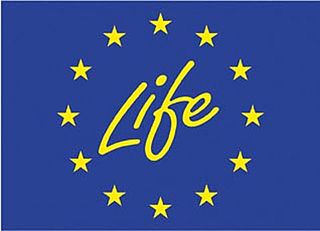
The LIFE programme is the European Union’s funding instrument for the environment and climate action. The general objective of LIFE is to contribute to the implementation, updating and development of EU environmental and climate policy and legislation by co-financing projects with European added value. LIFE began in 1992 and to date there have been five phases of the programme. During this period, LIFE has co-financed some 4600 projects across the EU, with a total contribution of approximately 6.5 billion Euros to the protection of the environment and of climate. For the next phase of the programme (2021-2027) the European Commission proposed to raise the budget to 5.45 billion Euro.
Brian Jeffriess is the primary spokesperson for Australia's Southern bluefin tuna fishing and aquaculture industry. He lives in Port Lincoln, South Australia and is the chief executive for the Australian Southern Bluefin Tuna Industry Association. He is a current member of the Australian Maritime and Fisheries Academy, the Commonwealth Fisheries Association, the Aquaculture Advisory Committee and the Fisheries and Aquaculture Research Advisory Committee. Jeffriess features regularly in the Port Lincoln Times newspaper, where he relates the industry's activities and interests to his local community. He attends the international Commission for the Conservation of Southern Bluefin Tuna meetings and works closely with industry and government. On 26 January 2012 Jeffriess was awarded Member of the Order of Australia "for service to the fishing and aquaculture industries as a contributor to the sustainable management and harvesting of Australian fisheries and through national and international professional associations." He has also been awarded State and National Seafood Icon status.
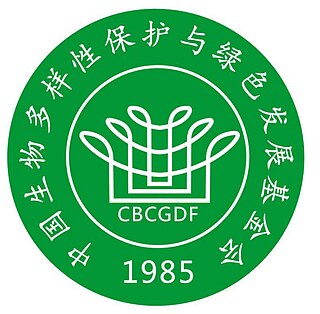
The China Biodiversity Conservation and Green Development Foundation (CBCGDF) is a proactive environmental non-governmental organization and a social legal entity which works to protect the environment, preserve natural resources and biodiversity in China and all around the globe. Its establishment is approved by the State Council, and it's a public offering foundation registered by the China Association for Science and Technology and the Ministry of Civil Affairs. Since September 1, 2016, it became one of the 16 charities which first qualified by the government. Since its establishment, CFNA has been committed to advocating ecological civilization, promoting green development and protecting biodiversity and the ecological environment.
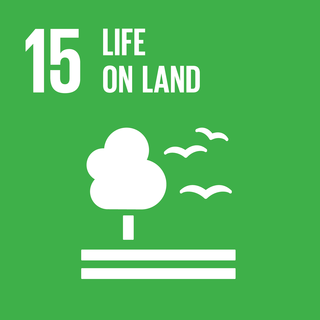
Sustainable Development Goal 15 is about "Life on land." One of the 17 Sustainable Development Goals established by the United Nations in 2015, the official wording is: "Protect, restore and promote sustainable use of terrestrial ecosystems, sustainably manage forests, combat desertification, and halt and reverse land degradation and halt biodiversity loss". The Goal has 12 targets to be achieved by 2030. Progress towards targets will be measured by 14 indicators.
The Scientific Centre of Monaco is a Monegasque public establishment providing the Principality of Monaco with means to conduct scientific research. CSM is specialized in the study of corals and coral reefs, as well as fight against cancer in partnership with the Flavien Foundation. CSM is grouped into three departments aimed at studying the functioning of organisms in order to acquire better understanding, foresee the effects of environmental stress or discover therapeutic treatments. CSM is headed by Patrick Rampal.
References
- ↑ "Fondation Prince Albert II de Monaco". www.fpa2.org. Retrieved 2021-06-18.
- ↑ "F20 – For a transformation that leaves no one behind – F20 – For a transformation that leaves no one behind" . Retrieved 2020-11-18.
- ↑ "Works from animalist painter Thierry Bisch devoted to endangered species with the support of the Prince Albert II of Monaco Foundation.-Contemporary animal painter threatened species". www.thierrybisch.com. Retrieved 2021-06-18.
- ↑ "The 2014 Winners of the Prince Albert II of Monaco Awards - 17/07/2014". Fondation Prince Albert II de Monaco. Retrieved 22 December 2016.
- ↑ "Annual Report 2015" (PDF). Prince Albert II of Monaco Foundation. Retrieved 22 December 2016.
- ↑ "WRC to receive Prince Albert II of Monaco Foundation 2016 Water Award". South African WRC. Retrieved 22 December 2016.
- ↑ "Tenth anniversary of the Prince Albert II of Monaco Foundation". www.yacht-club-monaco.mc. Archived from the original on 2016-11-26.